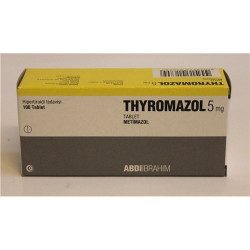Thyromazol, also known as methimazole, is a medication primarily used in the treatment of hyperthyroidism, a condition characterized by an overactive thyroid gland. This medication belongs to the class of drugs known as antithyroid agents and works by inhibiting the production of thyroid hormones in the thyroid gland.
Here is a general description of Thyromazol:
Key Features:
- Mechanism of Action: Thyromazol acts by interfering with the synthesis of thyroid hormones, specifically inhibiting the enzyme thyroperoxidase. This enzyme is crucial for the production of thyroid hormones, thyroxine (T4), and triiodothyronine (T3). By reducing the synthesis of these hormones, Thyromazol helps normalize thyroid function.
- Indications: Thyromazol is primarily prescribed for the treatment of hyperthyroidism, including conditions such as Graves’ disease and toxic nodular goiter. Hyperthyroidism is characterized by an overactive thyroid gland, leading to symptoms such as weight loss, rapid heart rate, and excessive sweating.
- Dosage and Administration: The dosage of Thyromazol is individualized based on the severity of hyperthyroidism and the patient’s response to the medication. It is usually administered orally in tablet form. The medication is typically taken once or twice daily, and the prescribed dosage should be followed as directed by the healthcare provider.
- Monitoring: Regular monitoring of thyroid function, including thyroid hormone levels and thyroid-stimulating hormone (TSH) levels, is important during treatment with Thyromazol. This helps healthcare providers adjust the dosage to maintain thyroid function within the normal range.
- Onset of Action: Improvement in symptoms of hyperthyroidism may take several weeks to months, and Thyromazol is often used as a long-term treatment.
- Potential Side Effects: Like any medication, Thyromazol may have potential side effects, and individuals should be aware of these. Common side effects may include skin rash, itching, and gastrointestinal symptoms. In rare cases, more serious side effects such as agranulocytosis (a decrease in white blood cells) may occur, requiring immediate medical attention.
- Pregnancy and Breastfeeding: Thyromazol should be used with caution during pregnancy, and the potential risks and benefits should be discussed with a healthcare provider. It may be recommended to switch to an alternative treatment during pregnancy and breastfeeding.
It’s important for individuals prescribed Thyromazol to follow their healthcare provider’s instructions carefully, attend regular check-ups, and report any unusual symptoms or side effects. This medication is typically prescribed and managed by endocrinologists or healthcare professionals specializing in thyroid disorders. As always, the information provided here is a general overview, and specific details may vary based on individual circumstances. Patients should consult with their healthcare provider for personalized advice and information.










Reviews
There are no reviews yet.